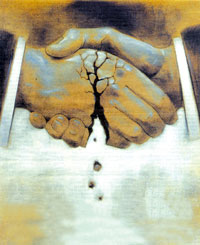|
|
Some countries are cursed with geostrategic importance or have huge oil reserves. This make them pawns in the turf wars of the big powers.
Happily, Nepal is not worth fighting over. The British in India and the Sino-Tibetans who invaded us separately in the 18th and 19th centuries realised that as soon as they caught a glimpse of this cantankerous and craggy country. Unlike Iraq, we don't have oil, and unlike Afghanistan our location is not that strategically pivotal.
The Nepali language media never tires of trying to get India and China to fight over us. But it has been clear for decades that New Delhi and Beijing have demarcated their spheres of influence. Both are still suspicious of the Americans romping around in their backyard, but the US ambassador in Kathmandu now gets briefed by Indian officials in New Delhi. And the Chinese seem happy enough to let India handle the Americans.
Although there may be no real territorial rivalry between the powers, what complicates matters is that Nepal has become a domestic political issue in India. Nepal may not have oil, but we have lots of water that India wants. Nepal's peace process is a joint project of India's ruling Congress-Left alliance, and the opposition Hindu right is keen to prove it a failure.
Hence, recent statements from BJP stalwarts and their VHP-RSS mentors supporting the revival of Nepal's Hindu monarchy. Bihar's anti-secular royalist bands are also on the rampage south of the border. The fact that these groups are operating in direct support of conservative Madhesis is all the proof we need about who is pulling the strings in the Tarai crisis.
This calls for better vigilance by India's Intelligence Bureau in the borderlands of Bihar and UP and increased coordination with the establishment in Delhi.
It goes without saying that the Madhesi people have genuine grievances against the Nepali state. And the Indians would not be playing games if our rulers were united and had a better sense of national mission.
But it looks increasingly like the solution to the standoff in the Madhes lies in New Delhi and in the hidden links between Kathmandu's royals and their Hindu right supporters and in-laws in India.
Nepal's kingship mustn't be a pawn in the religious chess game that Indian politicians play at election time. Here in Nepal, the ruling alliance thought they had the king cornered. But he is castling his rook.



